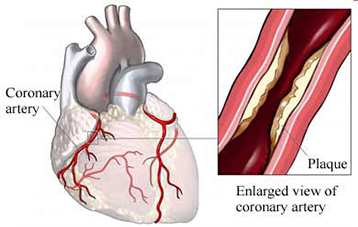Coronary heart disease treatment through regenerative medicine
 Fetal stem cells give marked positive effect in treatment of coronary heart disease, in particular of such its forms as myocardial infarction and angina pectoris.
Fetal stem cells give marked positive effect in treatment of coronary heart disease, in particular of such its forms as myocardial infarction and angina pectoris.
Coronary heart disease occurs as a rule because of atherosclerosis of heart (coronary) vessels. In this condition, fatty plaques are formed on the walls of the arteries, which either constrict the lumen or totally block blood vessels, impeding blood flow to the cardiac muscle. At first, narrowing of the lumen of coronary vessels is insignificant, and it occurs as pain behind breastbone (angina pectoris) under the conditions of physical activity, stress, cold, or overeating. If the plaque breaks, thrombi appear in constricted blood vessels, they block the vessel and lead to the development of myocardial infarction - death of part of the cardiac muscle due to its oxygen deprivation.
If coronary heart disease is not treated, due to oxygen deficiency, there appears malfunction of the most important cardiac ability - pumping ability, which leads to the insufficient blood flow to all other organs. This condition is called chronic cardiac insufficiency.
In contrast to known medicinal surgical treatment of coronary heart disease, which tries to preserve what is not yet destroyed by infarction, fetal stem cell treatment makes it possible to create new resistant germs of normally functioning healthy tissue in cardiac muscle (myocardium). As a result of this, more positive results in comparison with conventional methods of treatment are observed. Apart from the ability of stem cells to differentiate into different cell types, including heart cells, they are also able to stimulate formation and growth of the inner lining of blood vessels (angiogenesis), which plays a leading role in the development of additional vascular collaterals.
Coronary heart disease treatment in UCTC
At the Unique Cell Treatment Clinic treatment of patients, who had myocardial infarction or angina pectoris, is carried out by fetal stem cells of ectodermal and mesenchymal origin. Before the treatment optimal therapy is chosen, in complex with administration of fetal stem cells it gives the most long-lasting and steady effect, significantly improving the quality of life of the patient. Our specialists constantly monitor patient's condition after the treatment, and correct the dose of medications.
After the treatment by administration of preparation containing fetal stem cells, in 2-3 months, a marked improvement in the clinical course of coronary heart disease is noted. It is manifested in reduction of angina pectoris attacks almost in 2 times compary to baseline and significant dose decline of antianginal medications.
All patients notice expansion of home and physical activity, improvement of general state. On examination such changes are observed: improvement of general condition, increase of tolerance to physical exertion, reduction of signs of heart failure - shortness of breath, weakness, rapid fatigability, peripheral edema, hepatomegaly. Concentration of atherogenic blood lipids involved in formation of atherosclerotic plaques is also significantly reduced. Level of total blood cholesterol and cholesterol of low-density lipoprotein is reduced by nearly 20-25%, while concentration of cholesterol of high-density lipoprotein is increased on the average by 20%.
Examinations and treatment course for coronary heart disease in the Unique Cell Treatment Clinic, as a rule, take 3 days.
After the treatment with medications based on fetal cell suspensions there are significant clinical improvements in patients with coronary heart disease:
 |
New areas of healthy myocardial tissue appear, it improves the contractile function of the heart, which is especially important after a myocardial infarction. |
 |
Patients notice decrease of heart failure symptoms - general weakness, shortness of breath, palpitations, easy fatigue during physical activity, swelling of the lower limbs. |
 |
There occurs the development of additional vascular collateral microcirculatory bloodstream; it ensures trophism and delivery of oxygen to all the tissues and organs which suffer from hypoxia. |  |
Frequency and severity of anginal attacks reduces, physical activity tolerance increases, improving patients' life quality. |
 |
Content of "bad" cholesterol reduces, thus preventing the development and progression of atherosclerotic plaques in blood vessels of heart and brain, which is especially important for prevention of cardiovascular complications such as heart attack and stroke. |
